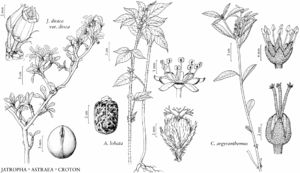Difference between revisions of "Astraea lobata"
Arch. Naturgesch. (Berlin) 7: 194. 1841.
FNA>Volume Importer |
imported>Volume Importer |
||
| (One intermediate revision by the same user not shown) | |||
| Line 40: | Line 40: | ||
|elevation=0–50 m. | |elevation=0–50 m. | ||
|distribution=Fla.;Mexico;West Indies;Central America;South America;introduced also in Asia (Arabian Peninsula;India);tropical Africa. | |distribution=Fla.;Mexico;West Indies;Central America;South America;introduced also in Asia (Arabian Peninsula;India);tropical Africa. | ||
| + | |introduced=true | ||
|discussion=<p><i>Astraea lobata</i> is a weedy annual widely distributed throughout the New World tropics and subtropics. It is not clear where in this area the species is native and where it has been introduced. The records from the flora area, which are restricted to Manatee, Miami-Dade, and Pinellas counties, probably represent introductions rather than natural occurrences.</p><!-- | |discussion=<p><i>Astraea lobata</i> is a weedy annual widely distributed throughout the New World tropics and subtropics. It is not clear where in this area the species is native and where it has been introduced. The records from the flora area, which are restricted to Manatee, Miami-Dade, and Pinellas counties, probably represent introductions rather than natural occurrences.</p><!-- | ||
--><p><i>Astraea lobata</i> is highly variable and it has been divided into numerous subspecies or distinct species. It is treated here as a single species; it is not clear if any of the subspecies warrant recognition. The Florida material agrees well with the type material of the species from Veracruz, Mexico.</p> | --><p><i>Astraea lobata</i> is highly variable and it has been divided into numerous subspecies or distinct species. It is treated here as a single species; it is not clear if any of the subspecies warrant recognition. The Florida material agrees well with the type material of the species from Veracruz, Mexico.</p> | ||
| Line 65: | Line 66: | ||
|publication year=1841 | |publication year=1841 | ||
|special status=Weedy;Introduced;Illustrated | |special status=Weedy;Introduced;Illustrated | ||
| − | |source xml=https:// | + | |source xml=https://bitbucket.org/aafc-mbb/fna-data-curation/src/2e0870ddd59836b60bcf96646a41e87ea5a5943a/coarse_grained_fna_xml/V12/V12_470.xml |
|genus=Astraea | |genus=Astraea | ||
|species=Astraea lobata | |species=Astraea lobata | ||
Latest revision as of 19:15, 5 November 2020
Herbs, 2–10 dm. Stems erect. Leaves: stipules linear-lanceolate, 2–6 mm, sometimes split at base; petiole 2–10 cm, glands 2, papillate, lobed or digitate; blade usually deeply 3(–5)-lobed, sometimes unlobed, central lobe elliptic to oblanceolate, 3–9 × 2–10 cm, larger than lateral ones, base truncate to rounded, apex acuminate, abaxial surface hairy, adaxial surface glabrate or hairy. Inflorescences 2–6(–15) cm; staminate flowers 3–15(–20), pistillate flowers 1–5(–7). Pedicels: staminate 2–3 mm, pistillate 1–2 mm (to 3 mm in fruit). Staminate flowers: sepals usually purple-tinged, ± unequal, narrowly ovate-oblong, 1–1.3 mm, enveloping bud before anthesis, apex blunt and ± hooded; petals hyaline, oblong, 1.2–1.8 mm. Pistillate flowers: sepals oblanceolate to spatulate, 4–7 × 1–2 mm, apex acute, semiappressed-hairy; ovary usually hairy, rarely glabrous; styles 2–4.5 mm, 3-fid, each branch then 2-fid, terminal segments 18. Capsules 5–8 × 5–7 mm, sparsely hairy. Seeds 4.5–5.5 × 2.7–3.5 mm, 2.5–3 mm thick, rugulose; caruncle shortly stipitate, reniform-peltate, 0.5–0.8 × 1.2–2 mm. 2n = 18.
Phenology: Flowering Jun–Nov.
Habitat: Open areas, disturbed habitats.
Elevation: 0–50 m.
Distribution

Introduced; Fla., Mexico, West Indies, Central America, South America, introduced also in Asia (Arabian Peninsula, India), tropical Africa.
Discussion
Astraea lobata is a weedy annual widely distributed throughout the New World tropics and subtropics. It is not clear where in this area the species is native and where it has been introduced. The records from the flora area, which are restricted to Manatee, Miami-Dade, and Pinellas counties, probably represent introductions rather than natural occurrences.
Astraea lobata is highly variable and it has been divided into numerous subspecies or distinct species. It is treated here as a single species; it is not clear if any of the subspecies warrant recognition. The Florida material agrees well with the type material of the species from Veracruz, Mexico.
Selected References
None.
